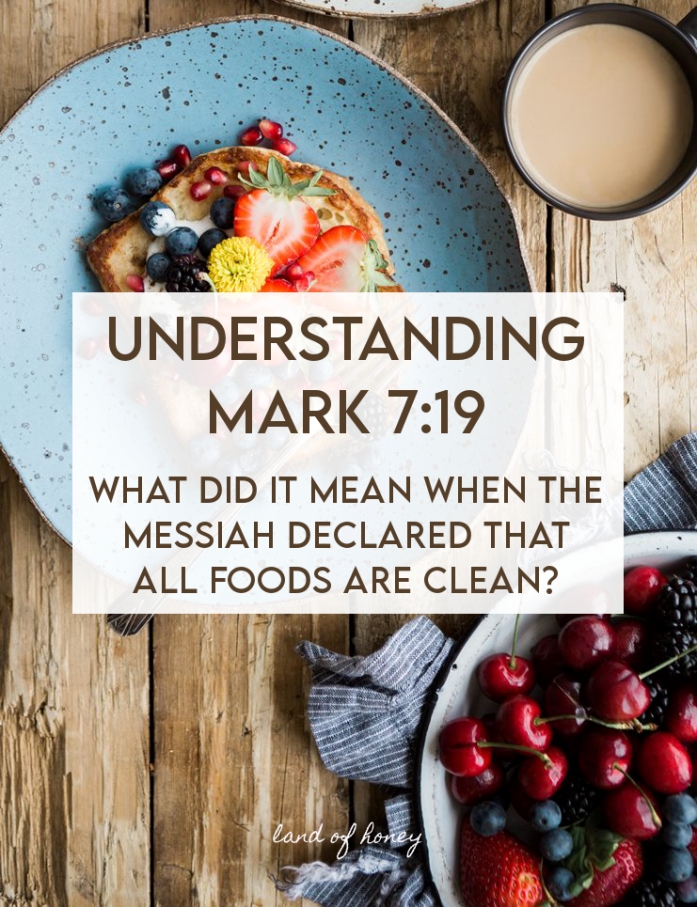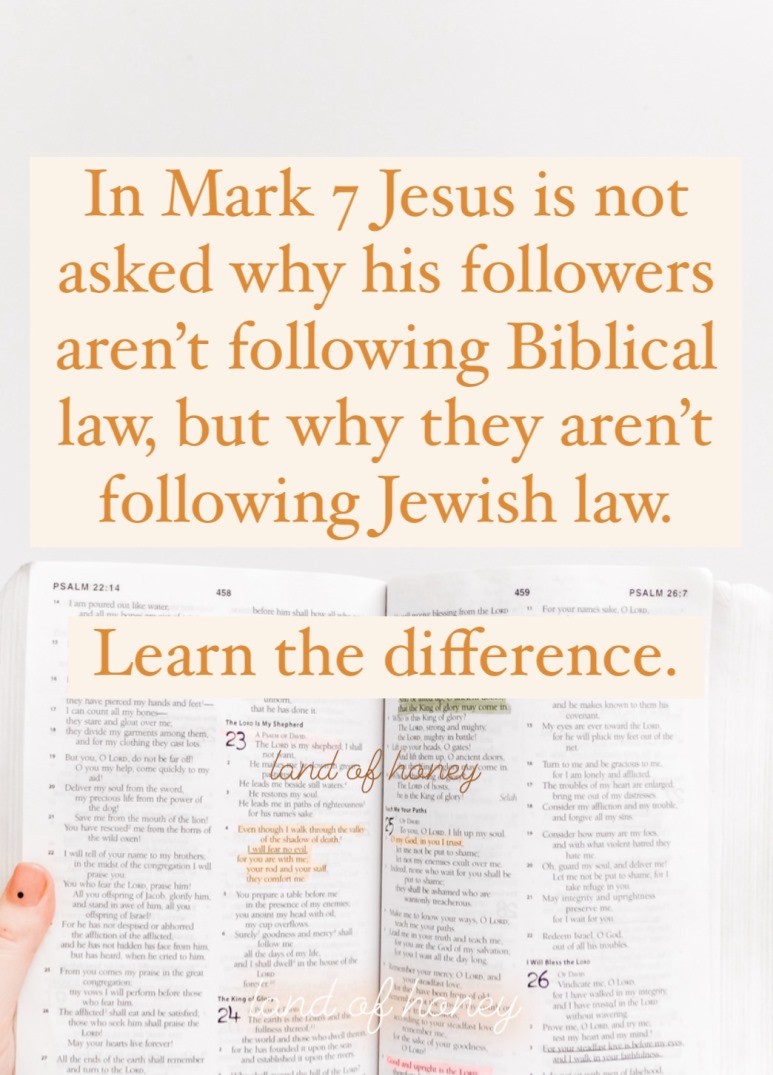When I first started learning about Biblically clean eating, Mark 7:19 (and it's counterpart versions in Matthew 15) is a verse that I kept going back to. Sure, many verses in Scripture articulate what we can eat and otherwise talk about eating according to the instructions we are given, but it says right here that the Messiah declared that all foods are clean!
"Don't you understand that the food you put into your body does not defile you? It passes through and doesn't go to your heart." (Thus he declared all foods clean.)
-Mark 7:18-19
These words used to make me think that God wasn't concerned about my dietary choices, because he was only concerned about my heart. And when I first started to feel like I might be called to keep Scripture's dietary commandments, this verse and it's seeming declaration of no rules confused me.
Scripture always lines up with Scripture. If it seems to contradict itself, that is caused by our misunderstanding. By stepping back and looking at the entirety of this chapter we will have a better picture of what this is about.
"Seeing some of his disciples eat bread with unwashed hands they found fault." -Mark 7:2
The setting here is that Pharisees and scribes came to the Messiah, and saw that his followers were eating without a ritual hand washing that was a tradition of the elders (verse 3). That is what they found fault with. Not in what the disciples were eating, since bread is considered Biblically clean, but that they were skipping a manmade tradition!
Mark 7 isn't talking about what is being eaten. If it was, the question would have been, "Why are your followers eating unclean animals?" or, "How come your followers are eating pigs?" But that was not what was going on! Followers of Messiah were skipping the manmade tradition of handwashing before eating and that's what offended these scribes that came to see Yahusha.
The Messiah says that the accusers were, "Forsaking the commands of YHWH, to hold fast to the traditions of men." (Verse 8) He was saying that the accusers were putting their own traditions ahead of the actual commandments of Scripture, which is an instance of the heart issue he brings up. If we give more honor and importance to human rituals than we do to the word of God, then our hearts have a serious problem. Today we often see this when people hold to their family or church's tradition of ignoring the dietary instructions and eating unclean animals. That is putting man's traditions above YHWH's commandment, and something the Messiah warns against in this chapter.
So why does the Messiah say that all foods are clean? Well, he really doesn't. The, "Thus he declared..." statement is in parentheses because it was added to later Bible manuscripts and not a quote from the Messiah. While it's wrong to add to Scripture, this foot-note would make more sense if we understood the context of it.
We hear, "All foods are clean," and assume this means we can eat whatever we want...even what the Bible says not to eat. But to understand this notation correctly we need to be aware that Scripture expressly tells us that unclean animals are not food (Leviticus 11:41, unclean animals are not to be eaten). Scripture never calls any unclean animal "food," it only calls Biblically clean things food. This is similar to our expectations of food today...there are just certain things that we don't eat. If I told you to help yourself to the food on the counter, you wouldn't eat the pile of mail or the houseplant or the pet goldfish there, because those things are not food. My saying, "Eat what you'd like," is not me suggesting or permitting you to eat what I don't consider food.
So why does he say that all foods are clean? He's not being redundant, he's explaining that everything the Bible says we can eat is considered clean...regardless of if you have washed your hands or done any other rituals that someone made up. He's saying that we are not defiled when we set aside manmade traditions, and we don't need to follow the Talmud or church tradition to considered holy in his eyes. The Messiah is declaring that if the item in question fits within the Bible's parameters for food then it is already considered clean without going through any manmade rituals. He is saying that if Scripture says you can eat it, you won't be defiled by skipping any un-Biblical extra steps.
The food you put into your body does not defile you. If we choose to consume something that Scripture calls an abomination, then we are defiled (Leviticus 11:43). The Messiah never said anything negative about Scripture's dietary commandments and he never did away with or changed any of them. This passage upholds the Biblical commandments while giving permission to not adhere to Jewish law (which are not the same as the laws and commandments in Scripture). By declaring all foods clean he encouraged us to stick with Scripture's instructions in place of manmade traditions.
More about Biblically clean eating:
10 Times the Bible Talks About Clean Eating
Understanding Peter's Vision
How To Eat Biblically Clean








.JPG)